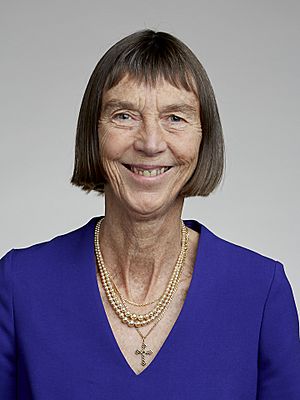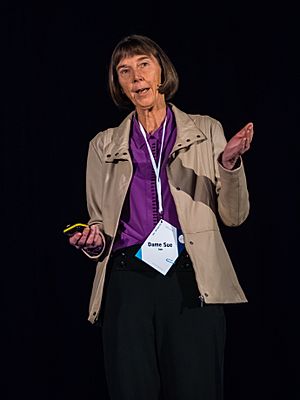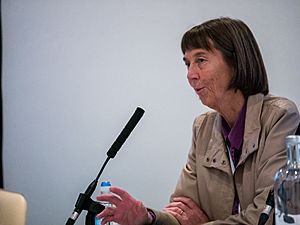Sue Ion facts for kids
Quick facts for kids
Dame Sue Ion
|
|
|---|---|

Ion in 2016
|
|
| Born |
Susan Elizabeth Burrows
3 February 1955 |
| Education | Penwortham Girls Grammar School |
| Alma mater | Imperial College London (BSc, PhD) |
| Spouse(s) |
John Albert Ion
(m. 1980) |
| Scientific career | |
| Institutions | Royal Academy of Engineering Nuclear Institute Imperial College London University of Manchester British Nuclear Fuels |
| Thesis | Dynamic recrystallisation in a magnesium alloy |
| Doctoral advisor |
|
Dame Sue Ion is a brilliant British engineer. She is a top expert and advisor on nuclear power, which is a way to make electricity using atoms. Her work has helped shape how countries think about energy. In 2012, she became a member of the National Academy of Engineering because of her important work on nuclear fuel.
Early Life and Education
Growing Up with Science
Sue Ion was born on February 3, 1955, in Cumbria, England. Her dad worked for British Rail, and her mom was a secretary. From a young age, Sue loved science. Her parents encouraged this by letting her do chemistry experiments right in their kitchen!
School Days and Inspiration
She went to Penwortham Girls Grammar School. She was a leader there, serving as Head Girl from 1972 to 1973. She was also the deputy leader of the school orchestra. When she was 16, Sue won a book about atomic energy. This prize really sparked her interest in the topic. She remembered that her school encouraged girls to study science.
University Studies
Sue went on to study Materials Science at Imperial College London. This field is about how different materials are made and how they behave. She earned a top degree in 1976. Then, she continued her studies and received a PhD in Metallurgy and Materials Science in 1979. Metallurgy is the study of metals. While finishing her PhD, she also taught at a school in London. She even brought supplies from her college lab to make science exciting for her students.
Career and Research
Starting in Nuclear Energy
In 1979, Sue Ion began her career at British Nuclear Fuels (BNFL). At that time, she was one of only two women working in the chemical engineering department. This shows how few women were in engineering back then. In 1992, she was promoted to Executive Director of Technology. She held this important role until 2006.
Advising the Government
During her time at BNFL, nuclear energy was seen as a very important way to power Britain. Sue believed it was an exciting field with lots of new ideas. She even told a BBC interviewer in 2013 that her view on nuclear energy had never changed.
Sue was part of Tony Blair's Council for Science and Technology. She is known for helping to convince the government to change its policy on nuclear power. She spent about 10 years educating government officials. She helped them understand the science behind nuclear power and renewable energy. This advice helped shape Britain's energy plans for the future. In 2004, she was invited to Buckingham Palace to celebrate her contributions to science and technology.
Nuclear Power and Renewable Energy
Sue Ion has studied energy for over 30 years. Early in her career, she spent a lot of time explaining nuclear reactors to government officials. She also worked to calm fears after accidents like those at Three Mile Island and Chernobyl.
She believes that modern nuclear power stations are much safer. She once said, "People worry about nuclear waste, but modern power stations create much less than in the past. I'd certainly have no hesitation living next door to one."
Sue supports building smaller, easier-to-move nuclear reactors. These "modular" reactors would be more affordable. They would likely be built at existing nuclear sites. She feels her biggest challenge has been convincing politicians that nuclear energy is truly needed. She believes that Britain needs a mix of renewable energy (like wind power), coal, and nuclear power for its energy future.
Encouraging Science Education
Sue Ion is a strong supporter of getting more women into engineering. She worries that some schools still think engineering is only for boys. She also believes that students need to start learning science subjects early.
She often tells students, especially girls, not to give up on science just because it seems hard. She explains that while creative subjects can be studied later, it's much harder to go back and learn the basic sciences. She wants all students to explore science. This is important because the engineering field needs many new people. There will be a huge demand for engineers to build new energy systems in the future.
She advises young people to "Grab every chance you've got to watch and learn from others. Take control of your career and ask for the development moves and the experiences that you feel will get you ahead."
Committee Service
Sue Ion has served on many important committees. These groups help guide science and technology decisions.
- She has chaired the EU Euratom Science and Technology Committee since 2010.
- She also chairs the Nuclear Innovation and Research Advisory Board.
- She was a board member for the Health and Safety Laboratory.
- She served on the Council for Science and Technology from 2004 to 2011.
- She has been a governor for the University of Manchester since 2004.
Personal Life
Sue Ion married John Albert Ion in 1980. They live in Leyland, Lancashire.
Honours and Awards
Sue Ion has received many high honours for her work. She was made an Officer of the Order of the British Empire (OBE) in 2002. She became a Dame Commander of the Order of the British Empire (DBE) in 2010. In 2022, she received the highest honour, Dame Grand Cross of the Order of the British Empire (GBE), for her services to engineering. She even represented the Order at the Coronation of King Charles III in 2023.
Scholastic Honours
Dame Sue Ion has held many important academic positions:
| Location | Date | School | Position |
|---|---|---|---|
| 2006 – Present | Imperial College London | Visiting Professor | |
| 2004 – Present | University of Manchester | Governor | |
| 2005 – Present | University of Central Lancashire | Honorary Fellow | |
| 2007 – Present | University of Central Lancashire | Honorary Professor | |
| 2011 – Present | London South Bank University | Visiting Professor |
She has also received several honorary degrees:
| Location | Date | School | Degree | Gave commencement address |
|---|---|---|---|---|
| 2011 | University of Lancaster | Doctor of Science (D.Sc) | Yes | |
| 21 July 2017 | Edge Hill University | Doctor of Science (D.Sc) | Yes | |
| November 2017 | University of Chester | Doctor of Engineering (D.Eng) | Yes |
Memberships and Fellowships
Dame Sue Ion is a member or fellow of several important engineering and science groups:
| Location | Date | Institution | Position |
|---|---|---|---|
| 1996 – Present | Royal Academy of Engineering | Fellow (FREng) | |
| 2012 – Present | National Academy of Engineering | International Member | |
| 2016 – Present | Royal Society | Fellow (FRS) | |
| 18 November 2016 – Present | Institution of Mechanical Engineers | Honorary Fellow (FIMechE) | |
| Institute of Physics | Honorary Fellow (HonFInstP) | ||
| Institute of Materials, Minerals and Mining | Fellow (FIMMM) |
Awards
She received the President's Medal from the Royal Academy of Engineering in 2014.
| Location | Date | Institution | Award |
|---|---|---|---|
| 2014 | Royal Academy of Engineering | President's Medal |
 | John T. Biggers |
 | Thomas Blackshear |
 | Mark Bradford |
 | Beverly Buchanan |



